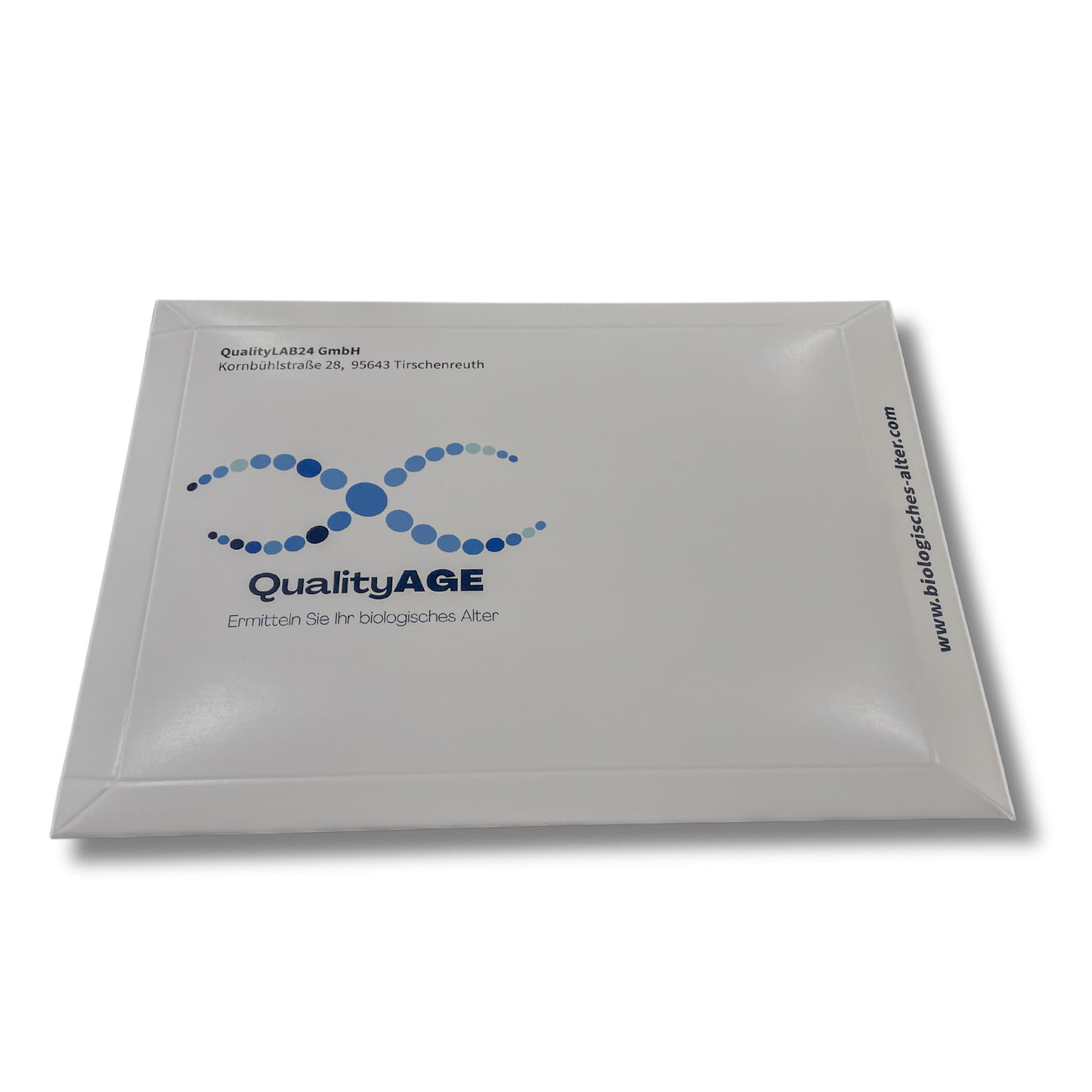Are you curious about your real age?
With our QualityAGE test you can find out your biological age .
QualityLab24
QualityAGE
QualityAGE
Couldn't load pickup availability
Determine your biological age
With the QualityAGE test you can find out exactly how old your body really is on a biological level. This so-called biological age shows you how your previous lifestyle has influenced your aging.
A younger biological age compared to your actual age indicates that you are in good health. Older age, on the other hand, can be a signal to reconsider your lifestyle. Measures such as regular exercise, a healthy diet, fasting or limiting nicotine and alcohol can have a positive effect on the aging process. The QualityAGE test helps you make informed decisions for your health.
A simple cheek swab is enough!
We offer you an easy-to-use analysis to determine your biological age: a simple cheek swab is enough and you will receive the test result within five working days, which can be both a confirmation and an incentive. Because your age is not just a number! It's in your hands.
How is biological age determined?
We conducted a study with 400 subjects aged 18-100 and assessed their individual, absolute telomere lengths. This is why we can rank your telomere length in comparison to other people in your chronological age group. Your biological age therefore corresponds to the average age of all people in your comparison group with the same telomere length. To ensure correct classification, it is very important that you tell us your actual chronological age when ordering the test.
We recommend the test from the age of 18.
Share



What is the so-called biological age?
While chronological age is simply a measurement of time in years of life, biological age takes into account the state of health of our body.

Further information
What are telomeres and what are they used for?
The DNA in our cells, about two meters long, is coiled into chromosomes and is located in the cell nucleus. Chromosomes have telomeres at their ends, which act like protective caps and prevent the chromosomes from breaking down. Telomeres are made up of DNA sequence repeats and shorten with each cell division, which is linked to the aging process. The initial length of telomeres varies between individuals and influences biological age and health risks, which is why monitoring them is useful.

TELOMER LENGTH
How is telomere length determined?
Various methods can be used to determine telomere length (Montpetit et al., 2014). We use the quantitative polymerase chain reaction (qPCR), which only requires a small amount of sample material or DNA. After isolating the DNA from the cells of the cheek swab, the relative telomere length is first determined using the qPCR method. To do this, your number of telomere DNA sequence repeats (T) is compared with the number of another DNA section (S) and the T/S ratio is formed (see figure below). By simultaneously analyzing a human DNA with a known telomere length, your average absolute telomere length is finally calculated.

Take your age into your own hands
Which factors have a negative influence on telomere length?
- Old
- Chronic stress
- Smoke
- excessive alcohol consumption
- Lack of exercise
- Severely overweight
- Bad eating habits
- Environmental toxins
- UV radiation
- lack of sleep
What can you do to positively influence your biological age?
-

Balanced nutrition:
Eat a balanced, nutrient-dense diet that includes fruits, vegetables, whole grains, lean proteins, healthy fats, and adequate fluid intake. Avoid processed foods, sugary drinks and excessive saturated fats.
-

Regular exercise:
Get regular physical activity, including cardiovascular and strength training. Aim for at least 150 minutes of moderately intense aerobic activity or 75 minutes of vigorous aerobic activity per week, along with muscle-strengthening activities twice per week.
-

Avoid negative stress:
Practice stress management methods such as meditation, breathing exercises, mindfulness training, yoga, or other activities that you find relaxing and enjoyable. Chronic stress can accelerate telomere shortening, so it's important to find healthy ways to manage stress.
-

Get enough sleep:
Aim for seven to nine hours of quality sleep every night. Prioritize good sleep hygiene, such as maintaining a consistent sleep schedule, creating a conducive sleep environment, and avoiding the use of electronic devices such as smartphones before bed.
-

Maintain a healthy weight:
Aim for a healthy body weight and maintain it through a combination of regular exercise and a balanced diet. Excess body weight, particularly obesity, is associated with shorter telomeres.
-

Drink enough:
Drink plenty of water throughout the day to ensure adequate hydration. Hydration is important for overall cellular health and can indirectly affect telomere length. Don't forget that good hydration is also essential for other body functions and increases well-being.
Is there anything to consider?
Limits of the investigation:
Our tests simply define your existing genetic conditions. All of our human genetic tests only serve to clarify existing suspected cases. No predictive tests are carried out.









